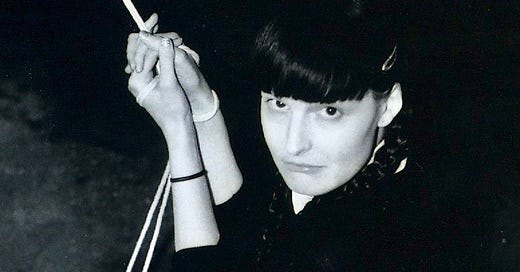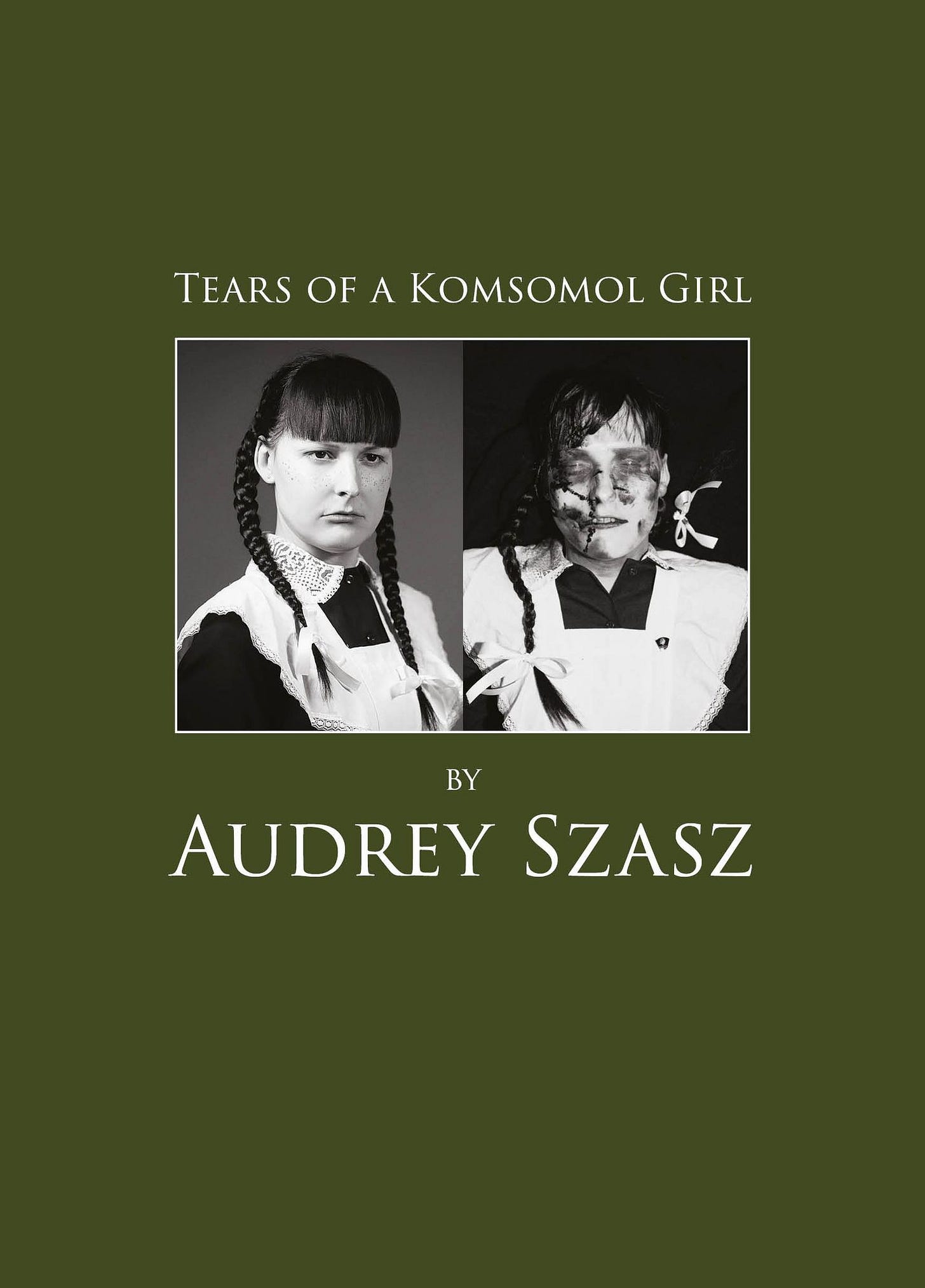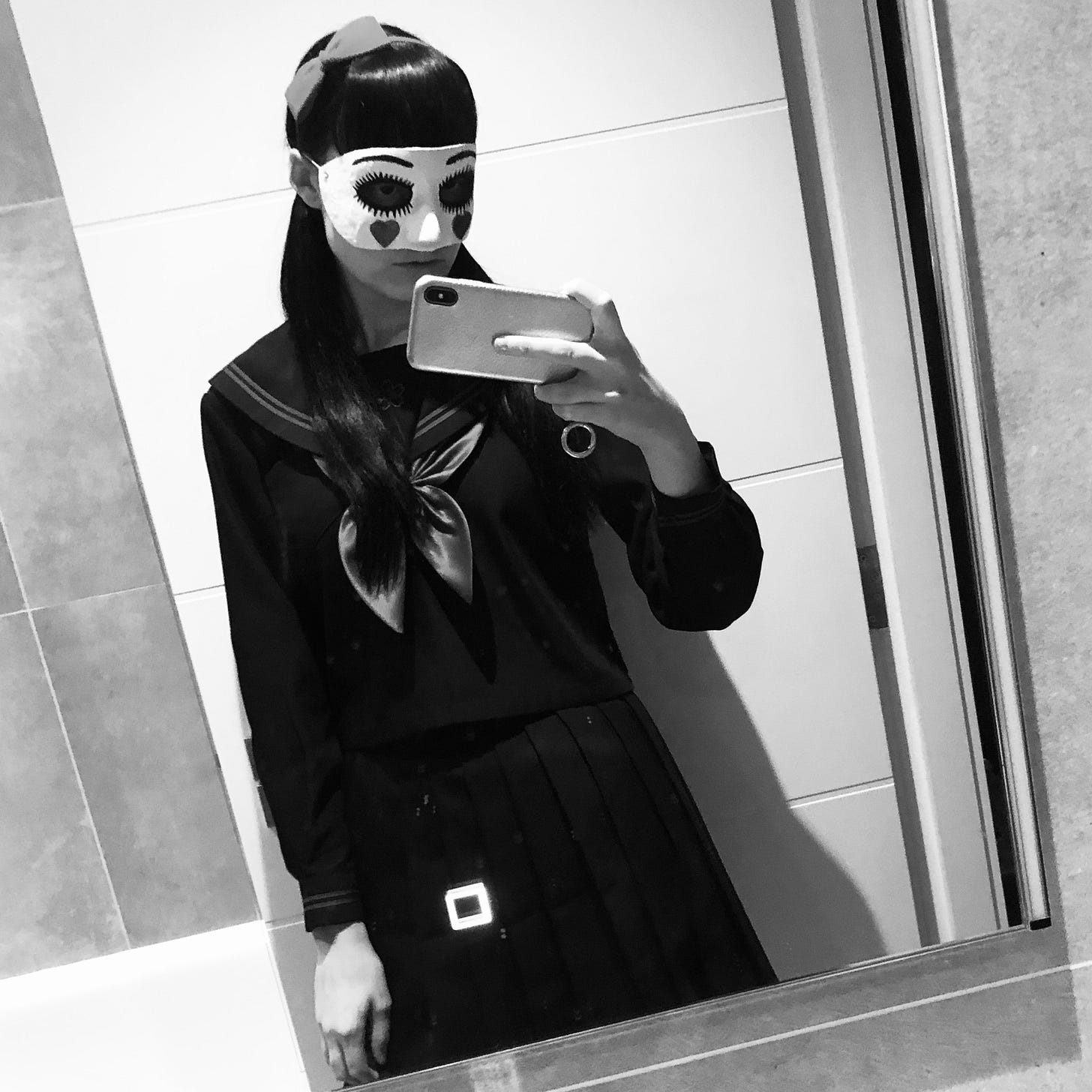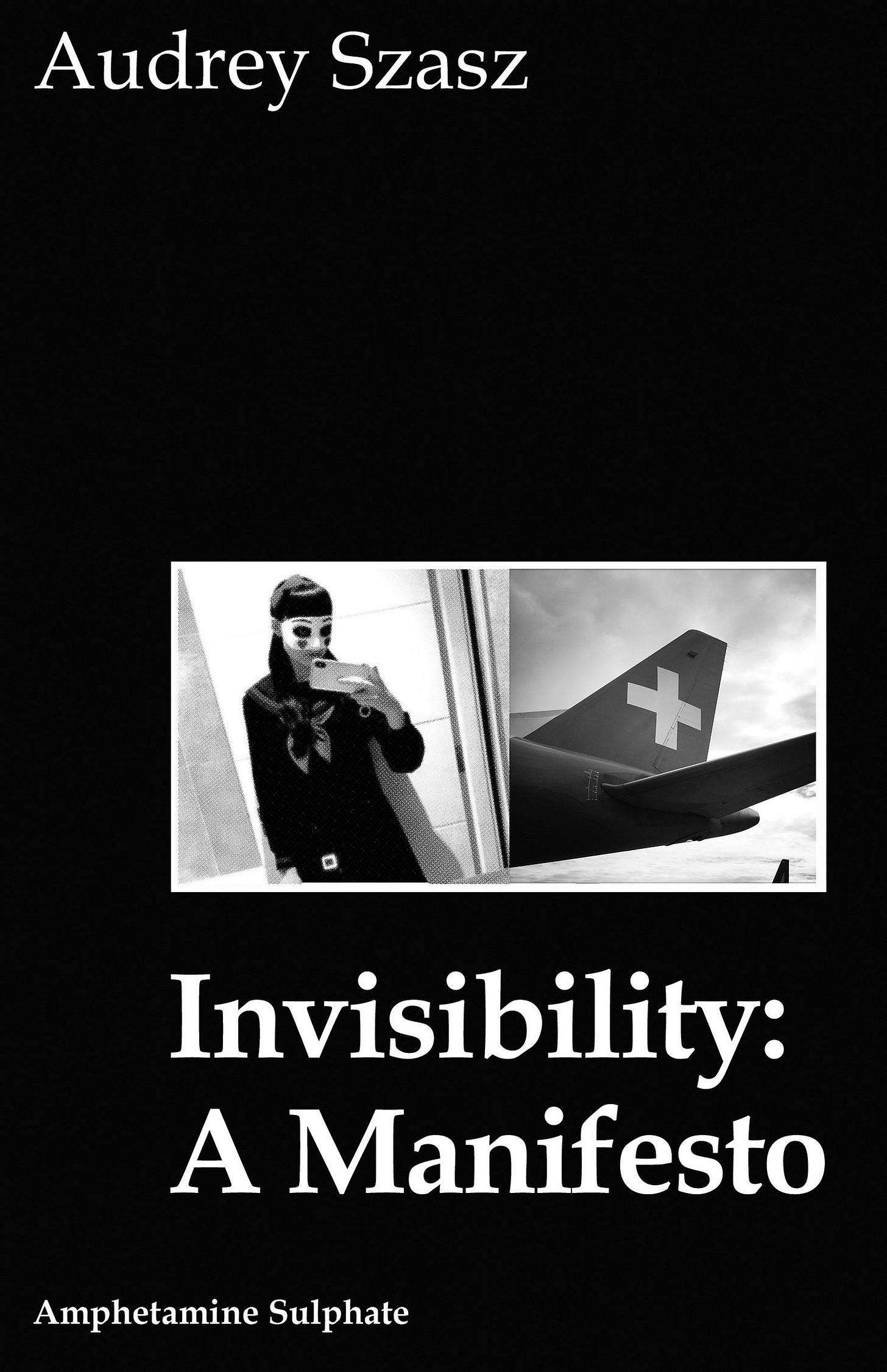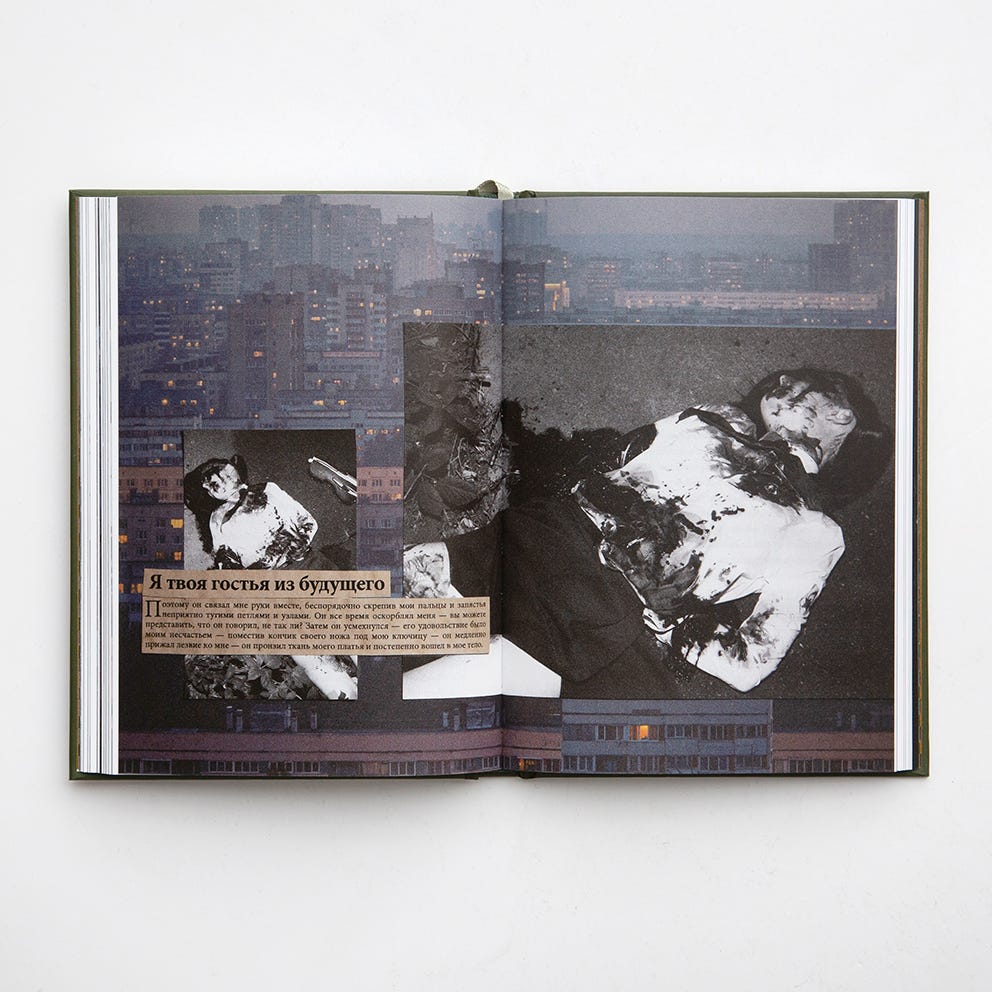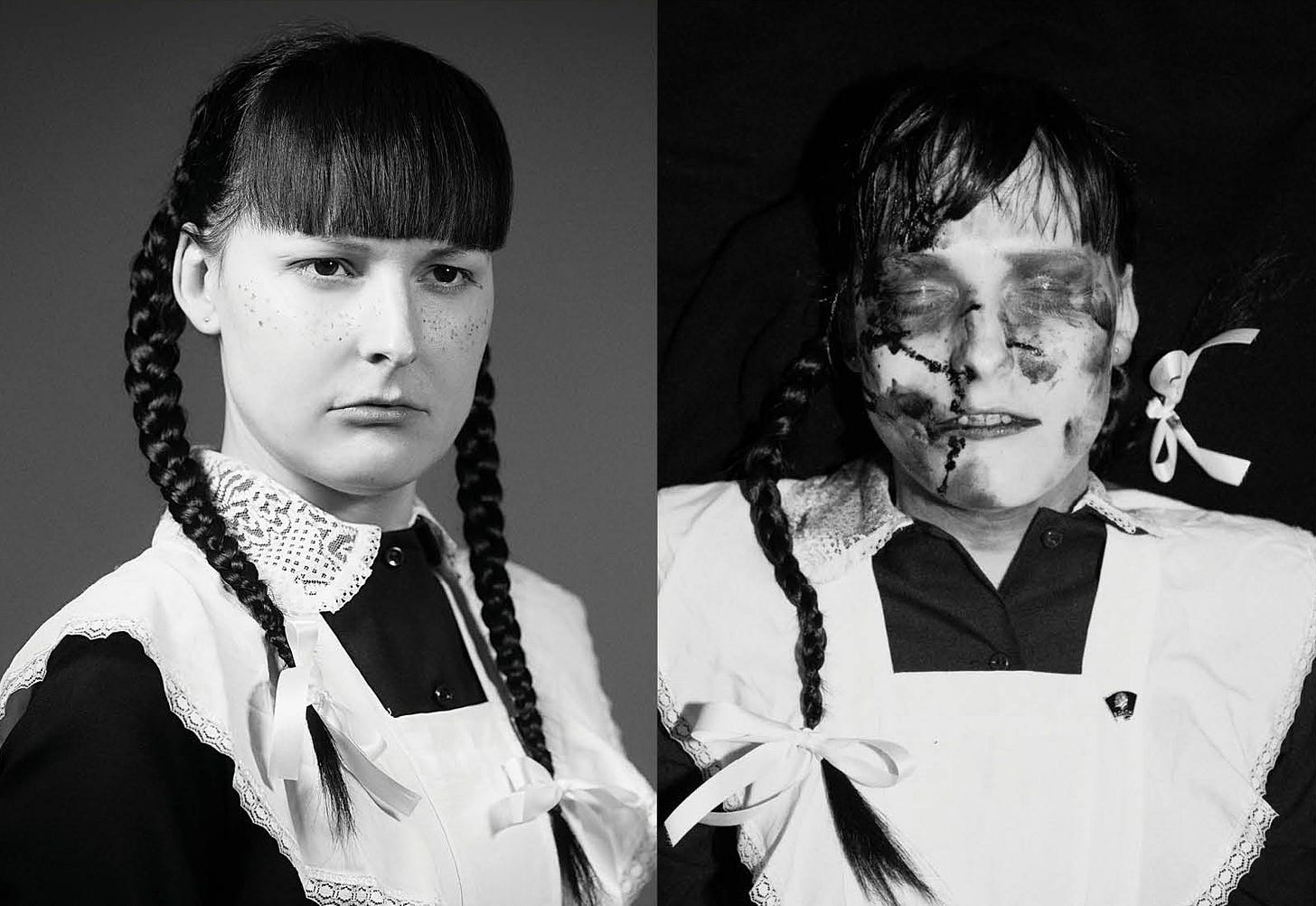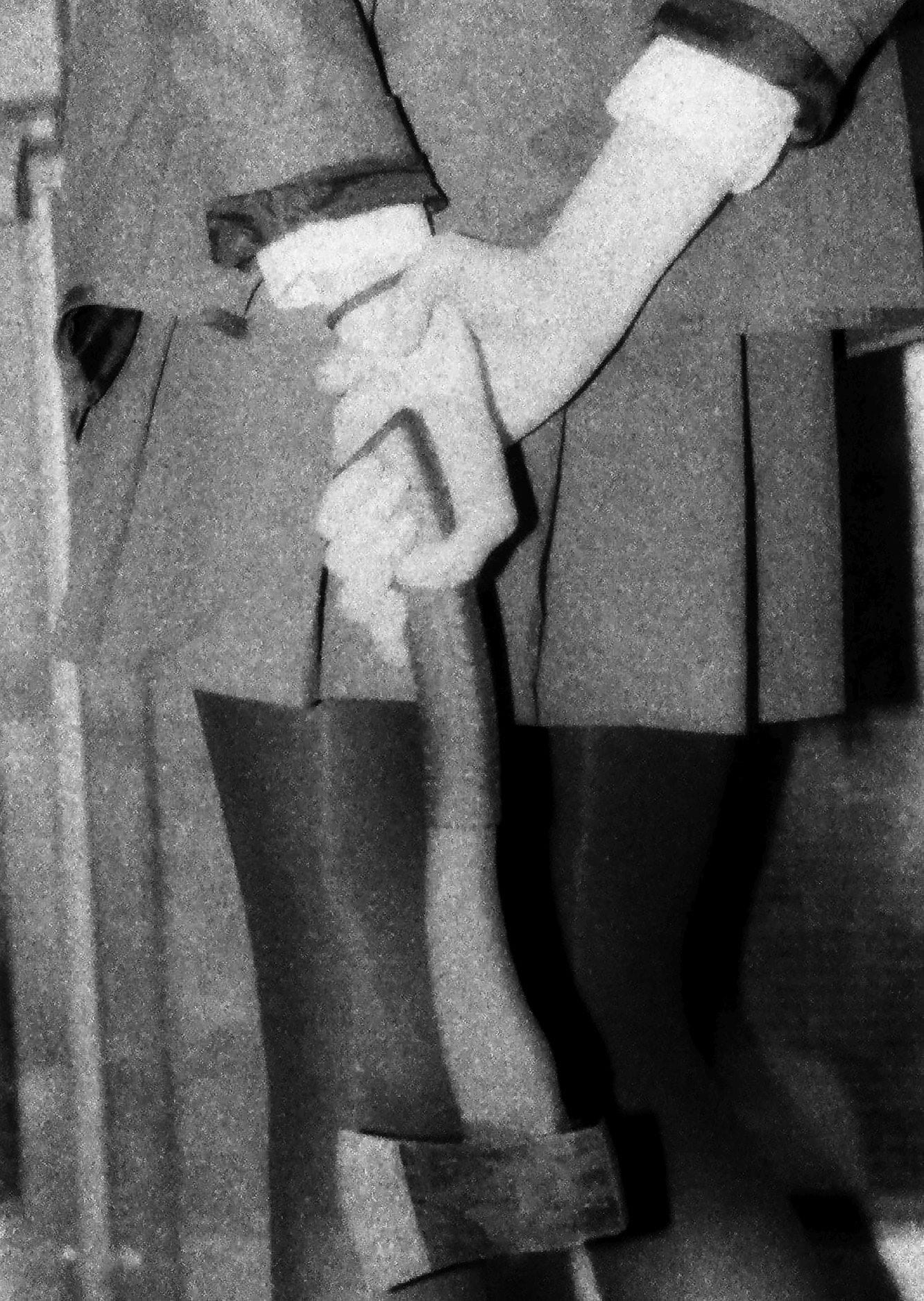Safety Propagandist #10: Audrey Szasz
UK-Based Hungarian writer and novelist Audrey Szasz discusses unreliable narrators, morbid curiosities, and 'Tears of a Komsomol Girl'
I first came across the UK-based fiction writer and poet Audrey Szasz when I ordered a couple books from Philip Best’s indie press Amphetamine Sulphate — I believe it was New Juche’s Stupid Baby and Simon Morris’s Sea of Love, but I can’t remember exactly — that I first came across Audrey Szasz’s writing. Ever the mensch, Best included some other books in the package for free. One of those books was Szasz’s Invisibility: A Manifesto. I must have read it sometime shortly following my completion of the Juche and Morris books, but all I remember is reading Invisibility in one setting and being absolutely fucking floored by the writer’s talent. The prose was utterly hypnotic. Light on dialog, the writing is simultaneously so imagistic and obtuse that at a certain point it starts working on the brain less like prose does than works of visual art do. Very few novelists have ever been able to write like this well: Maurice Blanchot did, Bruno Schulz did, Burroughs did, and Ballard did. Immediately then, I’m speaking about Szasz’s work alongside some literary artists closest to me – that’s how fucking good I think she is. Between her unique aesthetic and formal sensibilities and her enthusiasm for extreme characters and viewpoints, my allegiance to her writing was instantaneous.
Earlier this year, Infinity Land Press released Szasz’s new novel Tears of a Komosol Girl. The book, which I can confidently declare to be the writer’s best book so far, is an experimental concept novel based on the real-life crimes of Soviet serial killer Andrei Chikatilo, who was finally executed in 1994 having been convicted of murdering 52 people between 1978 and 1990. But Szasz’s novel isn’t true crime. It’s not even the kind of literary true crime practiced by the likes of Gary Indiana or Mikita Brottman. No, Szasz’s novel is far more hallucinatory that that, structuring the story as something like a delirious fairy tale intersecting with horrific IRL horror. Told through the eyes of a young girl and musical prodigy affiliated with the Communist Youth League in the late Soviet Union, Arina spends much of the novel cavorting with party men and lying compulsively before her sleep schedule is interrupted by ominous nightmares concerning the killer on the loose. From there, it only gets stranger…
Now, the interview. Audrey Szasz, a new recruit into the Counter-Agency of the Avant-Garde.
Adam Lehrer: Andrei Chikatilo killed over 50 women and children between the late '70s and early '90s. He was known as "The Butcher of Rostov" and was sentenced to death. Amazing serial killer choice to craft a novel around. How did you learn about Chikatilo, and what thrilled/fascinated/repulsed you about this story? How did you come to the idea that Tears of a Komsomol Girl would be your debut novel?
Audrey Szasz: It is my understanding (and personal experience) that Andrei Chikatilo has taken on an almost mythical status in the former Soviet Union. He remorselessly stalked, lured, and finally stabbed his victims to death, in the process torturing, mutilating and disfiguring them in some of the most callous and savage ways imaginable. When one considers the sheer number of crimes he committed, and the fact that many of his victims were children or adolescents, it is obvious why he is regarded with horror and revulsion. At the same time, it would be pointless to deny that serial killers in particular experience a certain level of fame, prestige and notoriety that is shared with various high-ranking politicians, so-called celebrities, artists, historical figures and even royalty.... One might maintain that this is due to the influence of popular culture or mass media — and perhaps to a degree there is some truth in this notion, but the link seems almost too facile. It is more likely that this phenomenon is (at least in part, and amongst other things) the result of a continuous interplay between the morbid curiosity of audiences (a quality which is arguably innate) and the manner in which certain authors, filmmakers and journalists (etc) seek to satisfy those appetites.... Without wishing to state the obvious, it seems highly likely that throughout human history true crime narratives have always possessed a certain attraction, and thus a man such as Andrei Chikatilo was destined to become an object of macabre fascination.
I cannot pinpoint the exact moment in time when I first learned about Chikatilo, but it was definitely online.... I can’t say in hindsight what it was that specifically inspired me, but rather I simply experienced a ‘vision’ of the novel, and I wanted to make it happen, so I set to work with this idea of turning my daydream into a reality…. I knew that I was never going to write a true crime novel (like Truman Capote’s In Cold Blood, just for example) or a sort of detective story…. That’s simply not my style and all of my books feature unreliable narrators and non-linear plotlines…. In terms of the title, that came before the actual writing process.... At some point in 2019 I watched a documentary about the Russian author Venedikt Yerofeyev and learned of his homemade cocktail recipes, one of which is referred to in Russian as Slyeza Komsomolki, which actually translates to “The Tear of a Komsomol Girl,” which to my ear is slightly poignant, as in, a single solitary tear.... But somehow in English, and as the title of my book, I decided that Tears of a Komsomol Girl sounded much better, and I also, for personal reasons, wanted to echo the title of Fassbinder’s The Bitter Tears of Petra von Kant, one of my favorite films....
Knowing that the Komsomol girl was regarded as an important archetypal figure (and also, as I see it, a role that might be performed, or a costume that might be socially and figuratively worn, by young women) in Soviet culture, and that in some ways the so-called Rostov Ripper was at one point (before his capture, trial and execution) an urban legend or had taken on a mythical status since the turn of the century, the idea formed in my mind to write a phantasmagorical novel set in the USSR during the days of perestroika incorporating or amalgamating these elements.... When I began writing my novel, I had in mind various ideas, including (but not limited to) Jung’s archetypes / the collective unconscious, the phenomenon of repetition compulsion outlined by Freud, Nietzsche’s musings on eternal recurrence and ressentiment.... Thus, I decided to wear this “costume” and “perform’”this role myself in the portrait photographs and collages by the artist Karolina Urbaniak which perfectly illustrate my novel. I am interested generally in exploring the subjects of emotional / social / psychological performance, just for example…. As Shakespeare once wrote: All the world’s a stage.
AL: The first piece I read by you was Invisibility: A Manifesto, after Philip Best sent it to me as part of an Amphetamine Sulphate care package. I was blown away by the hallucinatory stream of consciousness style of it. "The mother" as a figure becomes its primary archetype of sorts, but I feel like your writing functions in a way that your personal biography is encrypted somehow, like I never know if I'm truly reading a biographical manifesto or an approximation of one. This plausible deniability is what for me makes it work so well as literary art. That book doesn't read as auto-fiction, it's stranger than that. Does this idea of encryption make sense to you at all?
AS: Invisibility: A Manifesto was my first solo publication, so it obviously has a special place in my memories. I met the brilliant and insightful author Simon Morris in late 2019, and he offered to take a look at something I had been working on. We edited it together, exchanging emails over a number of weeks during November 2019.... When it was more or less finished, Simon urged me to submit it to Amphetamine Sulphate, which I did, and Philip Best offered to take it on, and of course I enthusiastically agreed. I felt that it was a real honor to join the roster at Amphetamine Sulphate, which had published many great pieces by a number of excellent writers and artists whom I personally admire, such as Martin Bladh, Steve Finbow, New Juche, Thomas Moore (just to name a few) and of course Philip Best himself.
In terms of your question, if my readers wish to project their fantasies onto me, if they wish to believe that various elements, or a certain percentage of my narratives are autobiographical, then who am I to deprive them of that incomparable pleasure? I couldn’t possibly comment now, could I? Naturally I am speaking very light-heartedly, and of course that’s all part of the fun — and I hope that there will be much more to come, because I genuinely appreciate my readers…. But there is also an element of seriousness in my comments too…. At the risk of coming across as somehow dogmatic or didactic, there is nothing more tedious to me than supposed objectivity, especially when it comes to creativity and imagination. I will never attempt to tell other people what to think or feel, but I reserve the right to contradict others in the (hypothetical) event that they grossly misinterpret my work.... I might even view the supposed ‘objectivity’ of others as a hostile imposition and a potential invasion of my personal freedom.... Which might seem somewhat extreme, but a certain level of liberty is indispensable.... Paranoid ideation aside, I’m going to live and exist and create in my reality, that I manufacture with the techniques at my command, and perhaps, if I am very lucky, there are more than a few people with whom I will be able to ‘intersect’ at some future point in time.... By which I mean that in writing my books, I guess that I am, on some level, attempting to create or share a kind of intersubjective vector….
I almost exclusively utilize unreliable narrators because my work thrives on mystery* — and in my opinion (or rather, my arguably twisted worldview), without mystery, there is no fascination. Without fascination, there is no glamour. Without glamour, there is no illusion. Without illusion, there is no magic. Without magic, there is no numinosity. And without numinosity, there is (for myself at least) no spark. Without this spark, there is no curiosity, no surprise, no pleasure.... I believe in chance encounters, intuition, synchronicity. I am crudely alluding to the joy of exercising my imagination. I believe in manifesting my dreams and nightmares in this imaginative realm. I do not wish to exist under the psychological restraint of limiting word games and sociocultural programs enforced and perpetuated by ignorant (or unimaginative) people that extend into everyday life as a manifestation of vapid conformity and therefore excessive banality. There should always be freedom to maneuver otherwise you’re just operating according to someone else’s scripts and that of course is mind-numbingly boring and arguably soul-destroying....
So, I am one of those people who prefers to run their own little program, as far as it is possible.... If I can’t run my own program, then I will continuously attempt with varying degrees of success to corrupt or sabotage or circuit-bend the existing or prevailing one. In doing so there is always the possibility of one’s behavior or habits being labelled as pathological, but that’s a risk I am obviously more than willing to take, because in my personal experience it is infinitely more satisfying to exercise one’s own free will than to be the useless slave of other people’s beliefs.... In that sense, all of my writing might be experienced as a coded message. But to be perfectly honest, I see my books as puzzles (I guess, like labyrinths or treasure hunts?) with various layers of meaning or interpretation, and I hope that my readers can repeatedly enjoy my work always finding new connections within the text…. Taking the analogy to its logical conclusion, I am therefore the only one who possesses the map or encryption key…. But because I have scattered metaphors and motifs, signs and symbols throughout the text, and I do leave things open to interpretation, I am more than content for my readers to take whatever meaning they will from the books, so long as I am not judged in bad faith, and I think it is better in most cases to allow any creative work to speak for itself, without analysing things too much....
Consequently, I don’t really like to publicly discuss my various techniques because I think it’s just too boring, self-absorbed, pretentious and conceited.... (Please see all of the above....) Haha…. And also, there’s a danger in revealing too much, because anything that is over-explained becomes devoid of interest…. I don’t believe in the sort of obvious reductive critiques or one-dimensional analyses that unfortunately seem so widespread these days…. Of course, I have my particular obsessions and compulsions and for the moment at least these are recurring themes in all of my books. I have no wish to (and I see no point in) denying that. But at the same time I don’t feel the need to elaborate either. To reiterate, I honestly think the best art thrives on mystery and the inherent depth that comes with complexity and the possibility of multiple levels of interpretation….
*There are naturally other reasons why I prefer unreliable narrators but I am unwilling to write an essay here....
AL: When did you start writing? What were you reading that first got you interested at all in reading and writing?
AS: My writing is connected to my very vivid imagination and a natural aptitude** for communicating in the written word which has always been with me for as long as I can remember. So I would always have been a writer of some sort regardless of what writers or books I have been inspired by. Without wishing to regress too much (but I’ll do it anyway), I have been dreaming up various forms of fiction ever since I became literate at a very young age. I was definitely able to read, for example, when I was three years old, because I remember waking up on the morning of my third birthday and reading an admittedly basic book (consisting largely of extremely childish illustrations) given to me as a present. I also remember that when I was in grade school I certainly had imaginary friends and invented convoluted stories, almost soap operas, for my dolls and other toys…. So I have been inventing (inflicting?) various fictions since my childhood, although obviously I would hope that the quality and complexity of my output has altered dramatically since then…. Haha…. Self-mockery aside, I have always enjoyed studying languages, and I have always been much more comfortable expressing myself through my writing rather than through direct speech…. I’m a little bit too introverted on occasion but I’ve learned to enjoy a bit of public speaking / performance so I don’t mind getting onstage or dressing up in absurd outfits from time to time. But I prefer intellectual activities in general, which I guess is nothing particularly unusual for a writer.... My favorite pastimes apart from writing are sauntering around town on my own, daydreaming and fantasizing. I have a photographic memory and often before I go to sleep I like to imagine I am dawdling aimlessly around various cities encountering various strange phenomena or participating in bizarre or fantastic events. Sometimes I even write about my dreams when they fit or seem to inform a particular narrative sequence. They become stories.... In this way I am able to manifest my own obsessions and desires in a literary form, and for some reason I find this satisfying....
There are numerous writers who have inspired me at different stages of my development and through various phases of my life so far. These would include, but are not limited to: Lautréamont, Baudelaire, Rimbaud, Burroughs, Ann Quin, Leonora Carrington, Breton, Anna Kavan, Jelinek, Plath, Ballard, Gogol, Krúdy, Chekhov, Philip K. Dick — there are honestly so many that it almost seems pointless to name them all. I’m also influenced by many filmmakers, artists and composers.... Anything that gives me a little spark of inspiration. It’s as simple as seeing something I admire, feeling inspired, and then making something myself, not necessarily based on or even derived from what inspired me, but just taking that feeling as a kind of motivating force (I guess a sort of energy pulse?) and then doing my own thing, so to speak.... I believe Vladimir Nabokov refers to this as a prefatory glow.... I might see an amazing painting, feel a certain buzz, and then go and write something totally unrelated…. I have never seriously attempted to imitate those that I admire, partially because I am too self-absorbed and idiosyncratic to succeed, but mainly because I do not wish to simply reflect the work of others, no matter how highly I may regard it — however, I certainly take (for want of a better word) some kind of ‘spark’ or ‘ideation’ from them and use that sense of creative urgency to initiate or perpetuate my own work.
I realize this statement possibly sounds quite arrogant, but naturally just like anyone else I have my strengths and weaknesses. There were many subjects at school in which I turned out to be a mediocre student at best.... Languages/literature/art were really the only things that interested me. So writing / editing / proofreading (and doing a little bit of performing) are genuinely the only things I am actually good at.... I am basically incapable of doing anything else....
AL: Considering the fact that this publication takes its name from a 'Crash' quote, I know you've collaborated with Jeremy Reed on a book inspired by Ballard, and also were part of a Ballard celebrating collection. Is Ballard a strong influence on your work? What was so special about him as an artist to you?
AS: Yes, my collaboration with the author, poet and biographer Jeremy Reed, Plan for the Abduction of J.G. Ballard, was my first ever work in print, so it’s something I’m understandably proud of. It was a really extraordinary experience for me to collaborate with an established (and in many ways legendary) figure on my first book....
J.G. Ballard was an admirer and an acquaintance of Jeremy Reed, and so he wrote introductions to many of Jeremy’s books. Plan for the Abduction came out in 2019 but I believe we began work on it at some point in late 2017 so I was relatively inexperienced at that time and still cutting my teeth, so to speak.... In that novel I definitely experimented with so many different narrative styles and storytelling techniques, which is something that I like to do in all of my books, although I’ve probably toned that side of things down a little since then and developed my own unique ‘voice’ much more.... I think that Plan for the Abduction.... really stands up and I am convinced that in the course of time it will be more widely recognized because there really is nothing else quite like it, although obviously I would say that wouldn’t I? Haha....
I have been and will continue to be an admirer of Ballard’s work. I love his use of language, his imaginative vision, but more specifically his subversive sense of humor, the elements of psychopathology blended with Surrealism. To my mind, Plan for the Abduction.... is not really about ‘Ballard the author’ or ‘Ballard the man’ as he actually existed (per se) and experienced his life — rather it’s an exploration of certain Ballardian themes and atmospheres, stretching certain metaphors and pushing those themes to an extreme, a sort of surreal or absurdist pathological science fiction.... It would have been all too easy to write a derivative novel imitating his vocabulary, his phrasing and syntax etc, and say ‘this is influenced by Ballard’ whilst shamelessly plundering his ideas — but that would have been a pointless pastiche and that’s obviously something we were never going to do. Arguably we took the more difficult (and interesting) route which was actually to expand on Ballard’s original ideas, apply them in a different way and branch out into other genres.... So in that sense I think that our book was very honest, we were very upfront about it, the title reflects that and the character of ‘Ballard’ is the star. A plan for abducting J.G. Ballard. An elaborate kidnapping. A hostage situation.... I envisaged it almost as stealing Ballard’s car and taking it for a reckless joyride around the galaxy....
So, obviously I admire J.G. Ballard very much and I have enjoyed reading many of his works; that almost goes without saying — it’s undeniable. And I have had the pleasure of contributing to the Ballardian anthology Deep Ends on three occasions now (from 2019 to 2021) alongside many other established authors.... But I may as well say it while I have the chance — I am arrogant (or honest) enough to state that the main influence on my work is increasingly none other than myself. Please take my hubris with a pinch of salt — it’s not that I want to come across as a boring narcissist.... Honestly, as a writer, I feel a genuine and very pressing need to take full responsibility for myself now — to do otherwise would be absurd.... I’m not going to hide like a little chicken behind the influence of others anymore.... I am making the assumption here that every writer who wishes to reach their potential arrives at a certain stage where they can no longer blame their influences and at some point one has to step out from the shadows and take personal responsibility.... This is what I am doing, and I’m ready to accept all the blame for everything I’ve ever written!!!! Haha. I’m thinking of my personality, my various innate or learned abilities and peculiar talents (or conversely, lack thereof), my aesthetic tastes (or lack thereof!), my sense of humor (....), my various impulses and arguably pathological personal obsessions, etc.... I’m not saying that I’m somehow special or trying to act like I’m clever, but I don’t think that anyone else really writes like me....
But having said all of that, and to round this section off, one thing in particular that I do happen to share with J.G. Ballard is the impression that ‘reality’ (or the components that comprise this supposed reality) is merely a stage set waiting to be dismantled or rearranged at any moment. And I very much appreciate his very rich and subtle sense of dark humor and willful perversity which I feel is often ignored in favor of focussing on his reserve of language or the economy of his words, the clinical tone, etc etc.... I’m more interested in the imaginative, surreal elements of Ballard’s work*** rather than the architecture or geography.....
***I’m thinking of books such as The Crystal World, Vermilion Sands, Crash, The Atrocity Exhibition, The Drowned World, etc....
AL: Your work is highly imagistic, and I love the video collages you've made. The Sade 'Justine' cut-up, and the "Have You Seen this Girl?" piece. Do you at all think that you might think of yourself as a visual artist in some way, or if there's a connection between literature and visual art? There are other writers that I can think of who similarly give me the sense of visual art in writing. Blanchot. Bruno Schulz. They are among my favorite writers. I see that in your work, if that makes any sense.
AS: Thank you very much once again for your kind comments. It is always a pleasure to receive positive feedback.... One of the many things I love about writing is the fact that I am able to practice it alone, either in silence, or blasting out some form of music through my speakers or listening quietly using my headphones. I enter a zone, or create a dimension for which I am solely responsible.... The visual / poetic / filmic aspect of my work is something that I consider to be essential (or intrinsic) but it also just comes naturally to me, so it isn’t something give very much thought to, it just seems to occur without any premeditation.... In terms of the video collages on my social media, I generally make them on my phone and post them to Instagram whenever I feel the urge, which is not very often. But it’s something that I might start to explore in more depth, especially in the coming months, or certainly next year.... The videos that are on YouTube on the Ragged Lion Press channel are a collaboration. Those are my soundtracks (mainly my electronic experiments, with my voice reading out poetry or prose layered on top of my noises / effects / melodies etc).... But the visual element on those couple of YouTube videos is provided by E.A.D. Sellors, and I think he did a great job.
I experience synesthesia, which influences my writing on various levels (imagistic, tonally, poetically etc) and also the electronic soundtracks I compose. So my writing does end up having some kind of filmic quality, I suppose, or at least, I utilize a lot visual imagery in my work. My writing tends to be full of adjectives and visual metaphors / symbolism…. Also I (unconsciously?) pay a lot of attention to timbre / rhythm / cadence / assonance etc…. In fact I like to utilize multiple narrative styles within my books just for tonal variety (amongst other things) and I generally would avoid using a ‘chatty’ or ‘informative’ or ‘omniscient’ narrator altogether, but there is a time and a place for everything, I guess — honestly I just try not to bore myself (and presumably the reader) to death…. All of this possibly sounds fairly pretentious or even slightly conceited but it’s genuinely something I do naturally rather than making a conscious decision to do it…. I don’t attach any sense of personal pride to it…. It’s not really a big deal to me…. But it is an integral part of my personal style, and like most people I gravitate towards what I like, and avoid what I dislike…. At the moment I am primarily working with words and sound. I may start making longer films (or collating clips) at some stage incorporating my soundtracks, spoken-word performances, and any footage that I go out and collect with my camera…. But at the moment, this is merely hypothetical and my main interest is writing fiction….
AL: What made you gravitate towards the literature that is transgressive, brutal, and unafraid to excavate life in all its troubling character?
AS: I think that ultimately I just followed my natural inclinations.... It’s just a question of my own individual tastes, or my own preferred means of expression. I am happy to remain within this literary underground (or at least, outside of mainstream commercial publishing) because in my personal opinion, it’s where the best authors are working right now. I do not think that my work necessarily has a broader appeal simply because it is too idiosyncratic to cross over into the mainstream, but perhaps I will one day be proved wrong in this regard.... In terms of a popular or general consensus, who knows what people might end up thinking about anything at all? I honestly don’t know — I am so disconnected from everything anyway.... All I really focus on is my writing and trying to create something that I find worthwhile…. But in terms of a literary underground, the only books I’ve read recently that I genuinely enjoyed (or thrilled me) were published by independent presses. For me, writing the books that I want to write is more important than any other considerations. I feel that if I couldn’t write exactly what I wanted to write, there would be no point doing it at all. I have never tried to titillate or shock anyone, but it seems to me that in any case it’s impossible to displease everyone.... I guess it wouldn’t be wildly inaccurate to say that I want to please my readers and other likeminded individuals with whom I (broadly speaking) share a similar or comparable taste in art / literature.... But ultimately I write because I simply can’t help myself. In that sense I possibly deserve to be pitied — it really is a Sisyphean mode of existence. It’s arguably extremely masochistic.... I just keep going and going, absorbed in my own obsessions and various neurotic preoccupations like a character in an absurdist play, and one day I’ll be dead.... My body will probably end up being cremated.... But seriously, I am very fortunate that my publishers always encourage me — they tolerate my various eccentricities and never try to dilute or censor my work.... I am very fortunate in that sense and it’s not something I take for granted....
AL: In the new novel, Chikatilo is quite literally haunting the narrator's dreams. Is this at all a stand-in for your dark fascinations? Do you ever find yourself up late at night daydreaming about killers?
AS: No, honestly, I don’t. Haha. I’ll save that sort of darkness for my writing, but my daydreams are much more bizarre.....
AL: Is there a difference in the way that you approach fiction and poetry? Your work seems to blend so many styles anyways, but is there a separate thought process for a work that presents as fiction and one that presents poetry?
AS: This is something I have occasionally thought about. Honestly, for me, I think it comes down to two things — intention and form. Obviously a poem is ‘supposed’ to look (and sound) a certain way. So if I’m writing poetry, then my starting point is different than if I were writing a novel, or simply experimenting in one way or another. In my case, I feel that a huge portion of my writing, or a large percentage of the text contained within one of my novels or novellas, takes the form of a sort of ‘prose-poetry’ — that is to say, I tend to automatically blur the lines between poetry and prose, use a combination of the two, or I use poetic language but arrange it so that it resembles regular paragraphs of prose. This is just how I naturally write — either because I enjoy it, or it’s just my style really, it’s not something I consciously think about, I guess it’s just a quality of my ‘voice’ as they say.... It’s not something I have set out to do with a ‘clinical’ mindset, it’s just how I prefer to do things.... Again, I honestly don’t enjoy analyzing it very much at all....
I think on the whole, my poetry is probably more image-laden (and symbolic or textured) than my prose, and the narrative voice withdraws at times or is more or less absent.... Whereas in my novels I tend to bring unreliable narrators in and out of the text as and when I see fit — I’m talking about tempo or balance I guess; I don’t personally enjoy novels that are dialogue-heavy, for example, and I like to space various elements out evenly to balance the novel in a way that I find satisfying — I genuinely think in terms of my work having an internal and external ‘architecture’ and like any symmetrical building there are load-bearing or ornamental components each fulfilling their aesthetic or structural function.... A poem can more or less stand alone and be largely decorative even if loaded with symbolic meanings, whereas with novels and longer stories or novellas there is more scope for depth, added symbolism etc.... So I would see one of my poems as a multi-faceted diamond or similar precious stone which could adorn a finger, whereas a collection of poems would be a tiara studded with various gems.... And a novel would be something else entirely.... A diamond mine deep underground, a labyrinth full of glittering gems in which one could become temporarily (temporally and spatially) imprisoned.... Which, again, probably just sounds completely pretentious but that’s just the first metaphor that came to mind.... Diamonds are forever — or a girl’s best friend etc, etc....
AL: Annoying question, but the readers love it, you have an afterlife dinner and MDMA party and you guys talk over wine and pasta and then dance to Aphex Twin and Throbbing Gristle. Who are the writers/artists/musicians/philosophers/whoever that you invite to this extravaganza?
AS: You know, this is the hardest question to answer, because there are so many variables, and I am extremely neurotic. I’m already worrying about whether one of my guests will be allergic to the canapes. Or whether there would be a brawl.... I’m questioning my ability to be a competent hostess.... Seriously, I dread the embarrassment of committing some gauche faux pas in front of the other girls at finishing school.... I have nightmares about it.... It’s no laughing matter.... You’d think it was a simple affair to arrange a bunch of flowers, but oh no, the whole ordeal is fraught with hazards.... Also I have a general horror of being obliged to converse at length with people I am unacquainted with, so the prospect of having to meet an array of philosophers or artists makes me slightly uneasy.... Besides, there are too many dead people to choose from. The possibilities are seemingly endless.... I would actually like the ability to enter paintings or movies.... I would like the ability to turn invisible and eavesdrop on various conversations, having time-travelled to the past or the future.... But that’s another matter entirely.... And I love to digress, so I have to restrain myself....
Going back to the question, it’s too tempting to invite a gathering of sworn enemies and oblige them to participate in a lengthy MDMA session and dance with each other.... That’s the sadistic aspect of my character, I suppose.... Also I keep remembering the old saying, “never meet your heroes” etc.... In fact, I would much rather just hang out with my actual friends in real life.... Or if I’m invited to some kind of event with other writers / artists then that could be fun.... What would be much nicer for someone like me, would be the option to have afternoon tea with an afterlife person. That would be better because I am so shy, but I could handle getting to know one person over tea or coffee.... Then I could meet so many people from history and it would only last for an hour or so before I could excuse myself if the other person was boring me to death.... I don’t want to tell anyone who I would meet, because it’s a secret.... I’m very superstitious so I really don’t want to meet any dead people ever. Unless I am dead myself.... I think this answer is an example of what is widely known in certain English-speaking regions as a “cop out” and I apologize profusely for that.... In any case, thank you very much for your interesting questions. I appreciate it....
ILLUSTRATIONS
1. Audrey Szasz by Pawel Haraszkiewicz
2. Tears of a Komosol Girl by Audrey Szasz, design and imagery by Karolina Urbaniak
3. Audrey Szasz selfie
4. Audrey Szasz Invisibility: A Manifesto
5. Tears of a Komosol Girl, design and imagery by Karolina Urbaniak
6. Audrey Szasz by Karolina Urbaniak
7. Audrey Szasz by Pawel Haraszkiewicz

